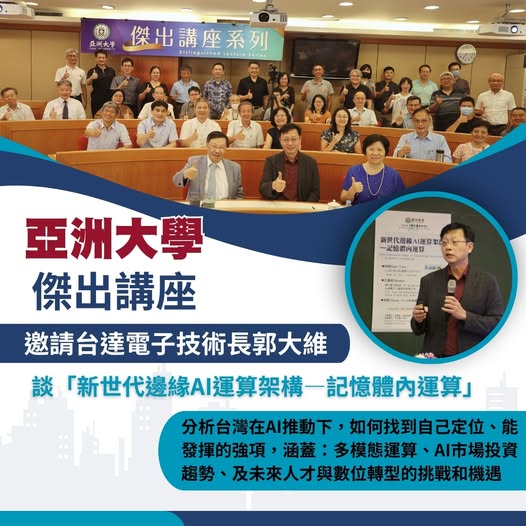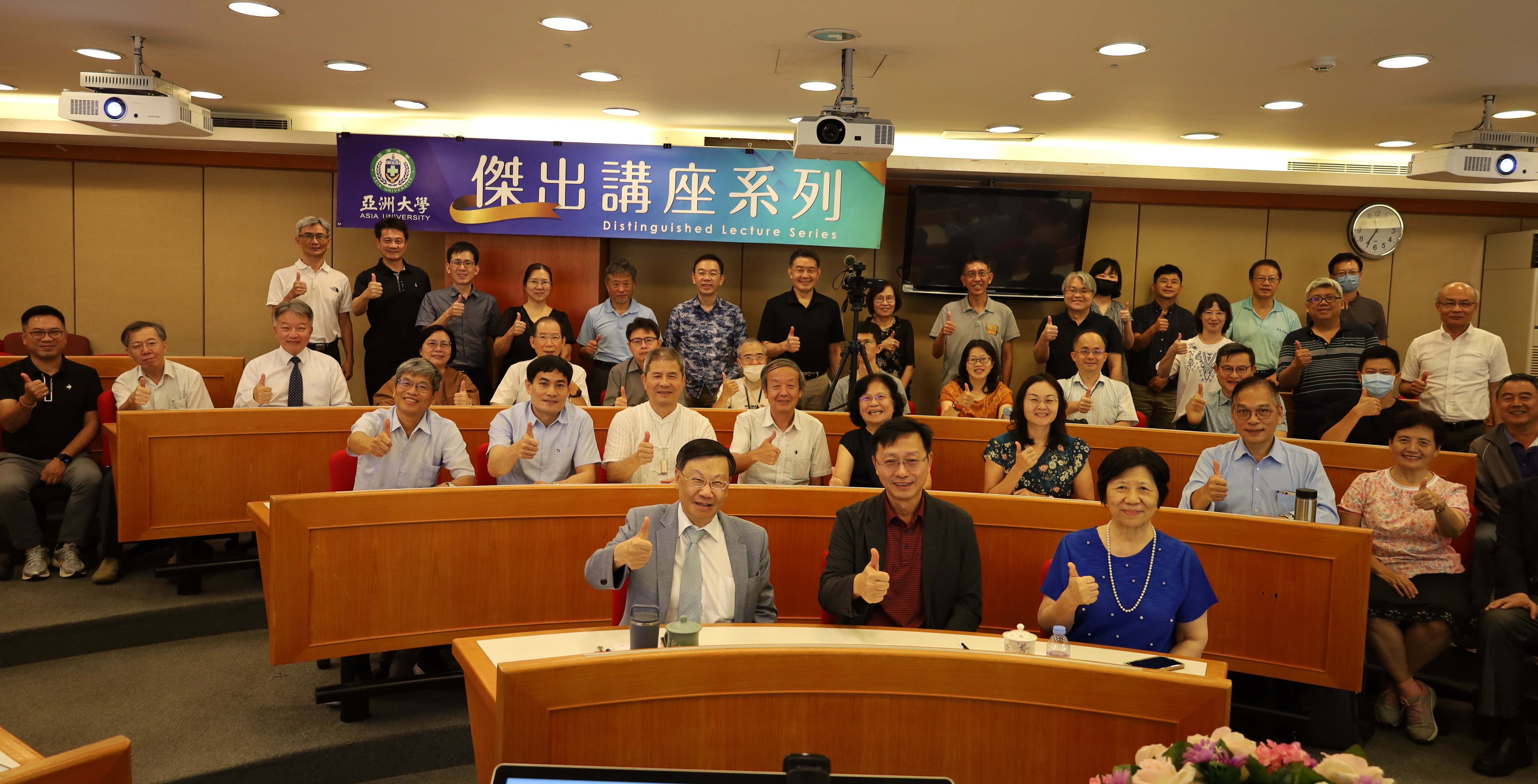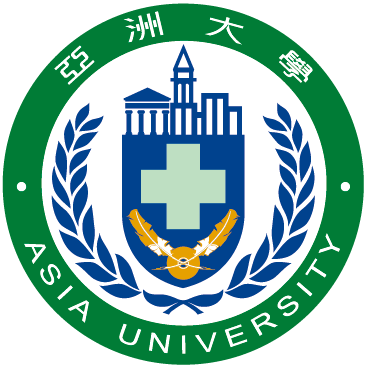Next-Generation Edge AI Computing Architecture — In-Memory Computing, and the Challenges and Opportunities for Future AI Talent and Digital Transformation
 Asia University President Jeffrey J.P. Tsai expressed his pleasure in hearing Chief Technology Officer Kuo share the latest key applications of AI. He added that Asia University looks forward to having further exchanges with him to explore how to cultivate future talent in the era of artificial intelligence.
Asia University President Jeffrey J.P. Tsai expressed his pleasure in hearing Chief Technology Officer Kuo share the latest key applications of AI. He added that Asia University looks forward to having further exchanges with him to explore how to cultivate future talent in the era of artificial intelligence.
On the morning of the 23rd, Asia University held a Distinguished Lecture featuring Dr. David Kuo, Chief Technology Officer of Delta Electronics. Dr. Kuo delivered a talk on “Next-Generation Edge AI Computing Architecture — In-Memory Computing,” sharing insights into the differences among edge computing, in-memory computing, and large-scale AI models, particularly in the context of energy sustainability and AI applications. He further analyzed how Taiwan, under the wave of AI development, can identify its own positioning and leverage its strengths. His lecture covered a wide range of topics, including multimodal computing, AI market investment trends, and the challenges and opportunities of cultivating future talent and advancing digital transformation. The session concluded with dynamic exchanges with Asia University faculty, focusing on the impact of AI and internal innovation on work value and productivity.
Asia University President Jing-Fa Cai expressed his honor in welcoming Dr. Kuo to the university. He praised Dr. Kuo as an outstanding scholar and industry leader, noting his distinguished career as a Distinguished Professor in the Department of Computer Science and Information Engineering at National Taiwan University, former Acting President of NTU, and current Chief Technology Officer at Delta Electronics. Dr. Kuo’s research fields span embedded systems, non-volatile memory software design, neuromorphic computing, and real-time systems. President Cai emphasized that with the rapid evolution of AI technologies, edge AI computing has become a vital area of focus. He expressed his delight at Dr. Kuo’s sharing of the latest AI applications and affirmed Asia University’s hope to further engage with him in exploring ways to cultivate future talent in the AI era.
Dr. Kuo emphasized that edge AI applications represent a critical segment in the ongoing wave of artificial intelligence, and one in which Taiwan can play a pivotal role. He noted that NVIDIA CEO Jensen Huang’s frequent visits to Taiwan each year are a clear indication of this significance. Beyond AI, Taiwan has long held an indispensable position in the global PC industry. As a global hub for semiconductors and electronics manufacturing, Taiwan is well positioned to seize the enormous business opportunities created by edge AI, which extend far beyond technological upgrades to encompass chips, embedded systems, communication modules, IoT devices, and smart manufacturing.
Dr. Kuo further explained that advancements in low-power NPUs and AI accelerator chips are driving the development of low-cost, lightweight AI models. Unlike traditional cloud computing, edge AI processes data locally at the “edge” of the network, enabling real-time responses without sending data to the cloud. This shift is expanding AI from the cloud to end-user devices. Applications such as AI PCs, smart manufacturing, intelligent in-vehicle systems, smart healthcare, and smart cities have already begun adopting edge AI technologies and are entering large-scale commercial deployment. Taiwan, he stressed, is well positioned to secure a strong presence in these domains.
Dr. Kuo cited Meta’s recent announcement of building an AI data center in the United States with an electricity demand of 5 gigawatts (GW) as an example of the enormous energy consumption behind AI infrastructure. He noted that a decommissioned nuclear power plant in Taiwan can generate about 1 GW, enough to supply electricity to millions of households. In other words, powering Meta’s new AI data center would require the equivalent of five nuclear power plants. He stressed that balancing energy consumption and sustainability is a critical issue that must be addressed alongside the rapid development of AI.
Dr. Kuo further pointed out that before 2023, many engineers believed programming jobs would not be replaced. However, in the past two years, the emergence of several landmark AI systems has quickly reshaped that perception. He explained that the field is evolving from large models to multimodal and more distributed operations, where computation is no longer confined to massive cloud-based systems but increasingly extends to edge computing. From the enterprise perspective, this shift reflects demands for higher quality, better accuracy, and improved training methods. At the same time, users are beginning to reflect on fundamental questions: while AI can indeed accomplish many tasks, what exactly is it doing, and how should AI be effectively managed?
When asked what areas fall under the scope of edge AI, Dr. Kuo explained that its applications are remarkably broad. For example, in Delta Electronics’ collaborative projects, preprocessing is used to improve efficiency, and data is parallelized before comparison to avoid excessive data loads. Devices such as smartphones, automotive systems, surveillance equipment, and robots can all operate with edge AI without requiring overly complex algorithms. He projected that by 2031, the global edge AI market will exceed 140 billion U.S. dollars.
Dr. Kuo stressed that in the AI era, the impact is not limited to large-scale models on industries. Equally significant developments are happening at the edge, where Taiwan can make important contributions—not only in industrial applications but also in households. This raises an essential question: what kind of talent is needed to drive these changes? He noted that while the past belonged to the computer era, today we have entered a data-intensive scientific age. In such an environment, the key challenge is determining how to harness the greatest power to achieve meaningful outcomes.
“The digital AI era has already begun,” Dr. Kuo remarked. He emphasized that the question now is what kind of talent can thrive and grow in this AI-driven world. Beyond technical expertise, soft skills such as communication, collaboration, and creativity are indispensable in this cross-disciplinary era. Strong critical thinking is essential to discern what tools may eventually be replaced and which skills will remain valuable. With the world changing at unprecedented speed, adaptability is crucial. Looking ahead, Dr. Kuo concluded, the future will be defined by the coexistence of humans and machines—but how we work and live together will be one of the most pressing questions to answer.

Asia University President Jeffrey J.P. Tsai(left), Delta Electronics Chief Technology Officer Dr. David Kuo (center), and Asia University Vice President Hui-Chen Ko (right) posed for a group photo with participating faculty members at the Distinguished Lecture.





